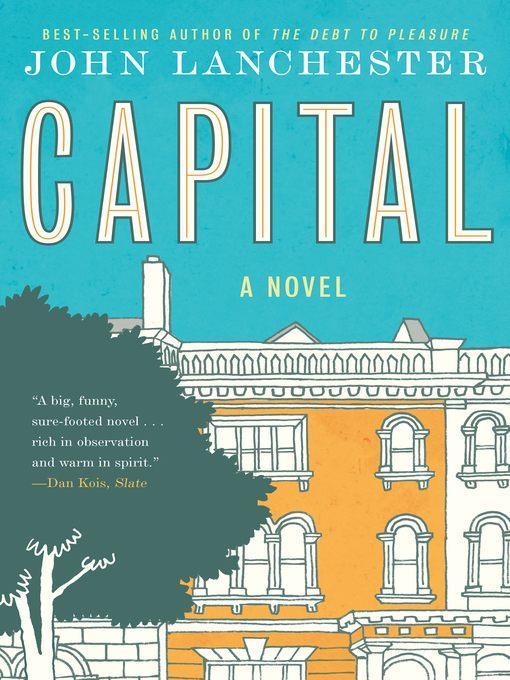
Capital
A Novel
- اطلاعات
- نقد و بررسی
- دیدگاه کاربران
نقد و بررسی

March 19, 2012
Lanchester (The Debt to Pleasure) follows on the heels of 2010’s I.O.U., a nonfiction dissection of the great recession, by covering much of the same territory in this barely allegorical study of class conflict and reversal of fortune. The affluent residents of London’s Pepys Road suburb are a handy cross-section of late-2007 types: Roger Yount, a banker riding high and counting on his bonus to cover mortgages and the needs of his spoiled wife; Shahid, the son of Pakistani immigrants working the family shop; the 17-year old soccer prodigy Freddy Kamo; Quentina Mkfesi, an educated Zimbabwean refugee turned traffic warden; the elderly Petunia Howe, living repository of Pepys Road’s postwar rise; and Petunia’s grandson, a Banksy-type artist named Smitty. This is just a sample of the cast, most of whom begin receiving mysterious cards reading “We Want What You Have.” Like clockwork, the quality of life on Pepys Road goes south, with arrests, injuries, illnesses, and financial undoing. But it’s hard to care, with predictable and seldom insightful plot threads, and Lanchester reducing his characters to their socio-economic parameters as surely as the market itself. The result is an obsequious, transparent attempt at an epochal “financial crash” novel that is as thin as a 20-dollar bill. Agent: Caradoc King, AP Watt.

June 15, 2012
Elegant, elegiac, eloquent novel of London life in the time when things lolly-related are definitively beginning to fall to pieces. Pepys Road was once such a nice street, a place destroyed by a V-2 rocket in World War II and rebuilt in such a way that aspirational veterans and young people could buy a stake in the British Dream. But that was then. Now, in 2007, after boom and bust and boom and bust, in a time of "bonuses which were big multiples of the national average salary, and a general climate of hysteria [that] affected everything to do with house prices"--well, only the rich can afford to buy in, and the old-timers are increasingly besieged. One of them is the well-heeled and pound-laden banker around whom Lanchester's (Fragrant Harbor, 2002, etc.) novel, as leisurely and complex as an Edith Wharton yarn, turns. But even he is much put-out, since his wife can't seem to get it in her head that money is not simply a thing to be spent at every waking moment. Meanwhile, from out in the darkness, messages are raining down, vaguely threatening, saying, "We want what you have." Ah, but practically everyone in this book wants everything, and those who don't want at least something that they don't have, from lost youth to a little peace and quiet. Who are the authors of these mystery demands? One thing that DI Mill (think, fleetingly, of John Stuart) concludes is that, first, they're not Nigerians or Kosovars or Eskimos, and second, though capable of better things, he's glad to have the distraction, even if "when he was doing routine repetitive work, that it was the equivalent of harnessing a racehorse to a plough." Mill finds plenty to do, and so does Roger, our banker, who's got a financial empire to save on top of his own bankbook and marriage. An expertly written novel of modern manners, with moments that read as if David Lodge or Malcolm Bradbury had stepped out of academia to take on the world of money and power.
COPYRIGHT(2012) Kirkus Reviews, ALL RIGHTS RESERVED.

January 1, 2012
It's 2008, and even as the economy shudders and falls, something sinister is happening on Pepys Road, London. The residents are all getting postcards reading "We Want What You Have." What that is, no one knows, but the ominousness fits perfectly with the anxiety of society at large, even as the novel chronicles the small, personal dramas of each household. Award winner Lanchester is always good to read.
Copyright 2012 Library Journal, LLC Used with permission.

Starred review from March 15, 2012
Renowned for his sharp humor and impeccable style, British writer Lanchester, winner of the E. M. Forster Award, presents an exceptionally capacious and involving tale about disparate lives in turmoil on London's Pepys Road. Originally a working-class enclave, by 2007 Pepys Road's property values have vaulted sky-high, accompanied by feverish gentrification, most lavishly at Number 51, where banker Roger Yount shrugs off his angry wife's exorbitant spending. While Arabella keeps Zbigniew, a Polish builder, busy redecorating, nothing visible has changed in decades at Number 42, home to the street's oldest resident, widowed Petunia Howe. A young soccer prodigy from Senegal is staying at Number 27. Pakistani Ahmed Kamal owns the shop on the corner. Meter maid Quentina Mkfesi is a Zimbabwean refugee. Smitty, a guerrilla street artist in the mode of the real-life Banksy, keeps his ties to Pepys Road secret. These separate lives gradually converge with profound consequences as each Pepys Road residence begins receiving unnerving postcards carrying the anonymous message, We Want What You Have. Lanchester makes us care deeply about his imperiled characters and their struggles, traumatic and ludicrous, as he astutely illuminates the paradoxes embedded in generosity and greed, age and illness, financial crime and religious fanaticism, immigration, exile, and terror. A remarkably vibrant and engrossing novel about what we truly value.(Reprinted with permission of Booklist, copyright 2012, American Library Association.)




دیدگاه کاربران